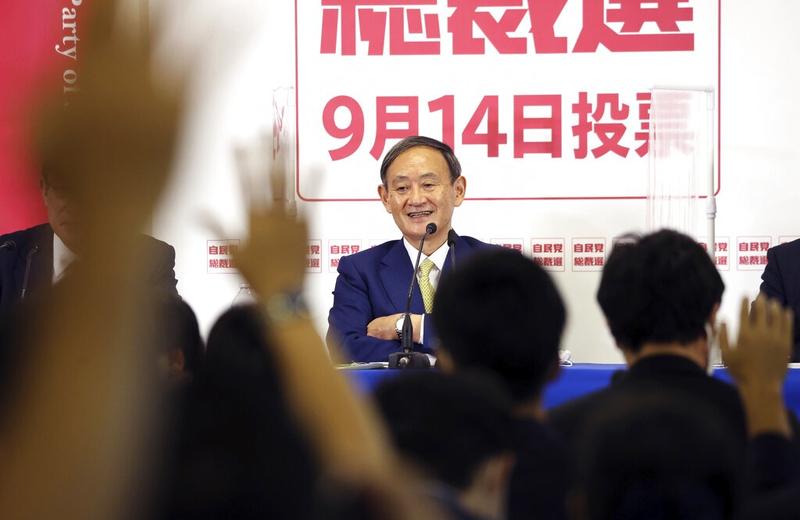 Japanese Chief Cabinet Secretary Yoshihide Suga, center, smiles as reporters raise hands for questions during a press conference for the ruling Liberal Democratic Party leadership election at the party headquarters in Tokyo, Japan, Sept 8, 2020. (YOSHIKAZU TSUNO / POOL PHOTO VIA AP)
Japanese Chief Cabinet Secretary Yoshihide Suga, center, smiles as reporters raise hands for questions during a press conference for the ruling Liberal Democratic Party leadership election at the party headquarters in Tokyo, Japan, Sept 8, 2020. (YOSHIKAZU TSUNO / POOL PHOTO VIA AP)
TOKYO - As Japan's ruling party formally kicked off its leadership race on Tuesday, frontrunner and Chief Cabinet Secretary Yoshihide Suga said that preventing the spread of the coronavirus should take priority in any decision to call a snap election.
Thinking about the dissolution of parliament and a general election, of course, we have to prioritize the coronavirus infection situation. What all of our people are expecting is to see the coronavirus infection contained as soon as possible ...
Yoshihide Suga, Japan's chief cabinet secretary
Suga, a favorite to succeed incumbent Prime Minister Shinzo Abe, who is stepping down due to poor health, also stressed that the biggest job for the new prime minister will be to revive the coronavirus-ravaged economy.
"Thinking about the dissolution of parliament and a general election, of course, we have to prioritize the coronavirus infection situation," Suga said at a news conference on Tuesday.
"What all of our people are expecting is to see the coronavirus infection contained as soon as possible so they can feel safe and their daily lives return to normal."
Suga is widely expected to win the Liberal Democratic Party's (LDP) leadership election on Sept 14, a date set after Abe's decision to step down last month due to a flareup of his chronic intestinal illness. The winner is virtually assured of becoming premier because of the LDP's parliamentary majority.
Markets have been rife with speculation that if elected, Suga may call a snap election to solidify his political grip. He signalled in an Asahi Shimbun interview that there was a chance of calling snap elections but cautioned that the coronavirus would impact any such decision.
That speculation got a boost after opinion polls showed a jump in voter approval of Suga and of Abe's achievements.
The LDP leadership race among Suga and two rivals - former defense minister Shigeru Ishiba and ex-foreign minister Fumio Kishida - kicked off formally on Tuesday.
Suga, chief cabinet secretary since December 2012, has already locked in support from most of the party's factions.
Markets have been rife with speculation that Suga, upon becoming prime minister, may call a snap election to solidify his political grip
READ MORE: Japan's Suga praises democracy in party vote stacked for him
In his first campaign speech, Suga, 71, said he would pursue his boss' signature "Abenomics" policies of hyper-easy monetary policy and government spending while grappling with the twin challenges of a coronavirus outbreak and reviving the virus-hit economy.
"We must first overcome this (pandemic) crisis, and then want to achieve strong economic growth by carrying out intensive reform and necessary investment to aim for new targets such as digitalization and supply chains," Suga said, adding he wants to break down bureaucratic barriers to reforms.
Japan's economy sank deeper into its worst postwar contraction in the second quarter as the coronavirus jolted businesses more than initially thought, data showed on Tuesday.
"The key in this ruling party election is how to revive an economy that suffered its biggest postwar slump," Suga said.
"That's the responsibility for someone who will lead the country."
Suga, who has little diplomatic experience, will also confront a range of geopolitical challenges including building ties with the winner of the US presidential election.
READ MORE: Suga leading in the race to succeed Abe
In remarks light on security and foreign affairs, Suga noted that Japan's security environment was tough and said he wanted to build "stable ties" with Japan's neighbors, including China.
He gave little space to the issue of revising Japan's post-war, pacifist constitution - one of Abe's cherished goals - saying only he wanted to pursue "constructive debate" that went beyond the ruling-opposition parties' divide.


